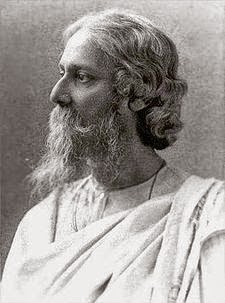Rabindranath Tagore’s Poetry in English: Evaluation and Controversy in Reading Gitanjali (Song Offerings)
Some literary problems never seem to go away. In spite of various attempts to look at Rabindranath Tagore’s English translation critically, there persists certain blindness to the possibility that his early poems in English did not uniformly merit the great affection they received. For example , after taking note of some critics who said that Tagore’s poems were “too thin and ethereal “ and that they “locked in intensity and passion”, Humayun Kabir ignored and begged the question by concluding , “Tagore’s standing as a poet is so unquestioned that it is not necessary even to discuss these aspersions of his critics.” However, it cannot be denied that his Bengali works are much more effective in the original rather than being translated!
Tagore's writing is highly imagistic, deeply religious and imbued with his love of nature and his homeland. Imbibed with the same spirit, it was Gitanjali (Song Offerings, 1910) that launched his great reputation in 1910’s. The manuscript of this book got Tagore the attention of William Butler Yeats, who wrote an Introduction to it and praised it highly, and the attention of Sturge Moore, who immediately nominated Tagore to the selection committee for the Nobel in Literature. It was Gitanjali that catapulted his receiving the prize in 1913 as the first non-European writer to be awarded. It was this book that enlisted Ezra Pound, who sent selection from it to Monroe for publication in an early issue of Poetry Magazine, the most influential of the little magazine in the renaissance of American poetry during the 1910’s. It was the poetry of this book that critics considered equal or superior to everything in the west from the songs of David, the writings of the Christian mystics, and Dante, on down to Million, Wordsworth and Shelley .Tagore was indeed one of the sensation of the time.
Tagore was first non-European to whom the great noble prize was given. Nevertheless, there is no need to assume that the prize was awarded for non-literary purposes. Nor is there reason to believe, as Pound thought that awarding the prize to Tagore was a compromise. Pound wrote that Tagore, got the Swiss Academy out of the difficulty of deciding between European writers whose claims appeared to conflict. The Swedish Academy had in fact been considering another writer, Emale Fagnet, but it had not been divided between two writers. Pound also suggested that Tagore got the prize because of his ‘religion and optimism’. There was no doubt that this great Indian poet and philosopher tried to deepen mutual Indian and Western cultural understanding and there probably was something in the religion and optimistic theme of Tagore that impressed the committee, and these broadly considered, are literary concerns.
 Among the most influential poets of the English Speaking world, it was Yeats and Pound that did more than anyone else to established Tagore’s reputation in English and America, yet both in time lost patience with Tagore. Any analysis of Tagore’s reputation and his poems in English must take into account the attitude and motivation of these two writers. As professional men of letters and humanitarian, both were interested in the literature of the non-English Speaking world: therefore, Yeats and Pound world naturally encourage this new and difficult voice from the east. It was their job to do so; nevertheless, one must observe that they went overboard in their enthusiasm. the introduction Yeats wrote to Gitanjali was called, hyperbolic, and ‘impetuous ‘,and one review seemed to contain a sarcastic ,veiled reference to Yeats as an aesthete and Pound as an iconoclast when it reported that Tagore’s poetry has ‘the familiar humanitarianism that approach so piquantly alike to the delicate aesthetic and the prosperous iconoclast’.
Among the most influential poets of the English Speaking world, it was Yeats and Pound that did more than anyone else to established Tagore’s reputation in English and America, yet both in time lost patience with Tagore. Any analysis of Tagore’s reputation and his poems in English must take into account the attitude and motivation of these two writers. As professional men of letters and humanitarian, both were interested in the literature of the non-English Speaking world: therefore, Yeats and Pound world naturally encourage this new and difficult voice from the east. It was their job to do so; nevertheless, one must observe that they went overboard in their enthusiasm. the introduction Yeats wrote to Gitanjali was called, hyperbolic, and ‘impetuous ‘,and one review seemed to contain a sarcastic ,veiled reference to Yeats as an aesthete and Pound as an iconoclast when it reported that Tagore’s poetry has ‘the familiar humanitarianism that approach so piquantly alike to the delicate aesthetic and the prosperous iconoclast’. 

Sir,
ReplyDeleteI'm greatful for your helpful posts on English Literature and SSC. Hope you soon post on School Service English(PG/HONS).
Thanking you.